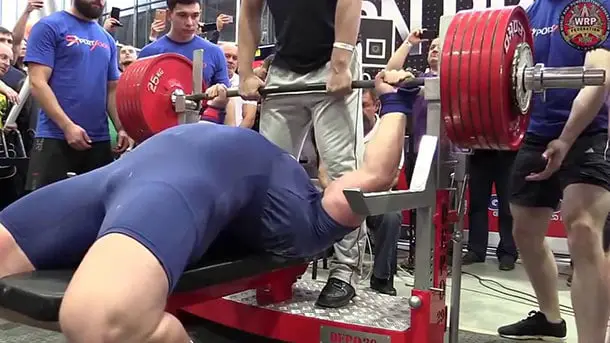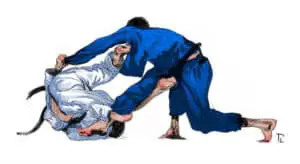
BJJ athletes need to be strong. Don’t listen to what some Gracie cult member says about BJJ being all about leverage. Instead look at the best competitors in the world the majority of them are heavily muscle bound and are in the gym lifting weights. BJJ athletes use strength to maintain and break grips, pin their opponents, squeeze when finishing submissions and perform takedowns.
BJJ athletes are always on the hunt for new strength movements that can give them an edge over their fellow competitors. In this article we study one of the most popular strength building exercises, the bench press and reveal whether BJJ players should be benching or not.
Is bench press good for BJJ athletes?
While bench press is routinely performed by BJJ athletes, it is the least effective exercise of the 3 powerlifting movements. BJJ athletes rarely engage in the upper body pushing motion trained by the bench press. BJJ is a leg dominant sport and athletes’ power output is spurred largely by their legs, making the squat a highly beneficial exercise.
The bench press trains mostly the chest, shoulder and tricep. It is a great exercise for improving an athlete’s chest, shoulder and tricep strength and muscle mass.
The issue with the bench press for BJJ athletes is that during BJJ competition chest strength is not a major factor and athletes do not frequently use an upper body pushing movement. BJJ athletes only use a pushing motion when pushing off an opponent to create space.
BJJ is a martial art that is much more lower body dominant than upper body. Then why do so many BJJ athletes continue to bench press?
BJJ athletes and strength and conditioning coaches typically just use exercises that are popular and other athletes are using. Over the last 40 years the bench press has become one of the most popular strength exercises worldwide. As powerlifting has become widespread, which features the bench press, the bench press has continued to find its way into BJJ athletes’ strength programs.
The popularity of a particular exercise is not related to its effectiveness. In BJJ the lack of required chest strength and pushing motion means the bench press is not suitable. While BJJ athletes should be well balanced and overall strong it does mean they need to bench press regularly in an effort to develop shoulder and chest muscle/strength.
If BJJ athletes need to increase their shoulder strength the standing barbell press is a better strength exercise than the bench press. BJJ athletes could also add the push press to thor strength routines as it also works the hips and quads in conjunction with the shoulders.
If BJJ athletes require some added chest mass incline dumbbell press or chest flies are superior options. Both of these strength movements are more effective than the bench press at isolating the upper chest resulting in greater levels of muscle development.
Another significant problem with the bench press for BJJ athletes is the chance of suffering a major injury. The bench press causes 1.35 injuries per 1000 hours. While this is low compared to BJJ’s injury rate this is not evidence the movement is free from injury risk.
BJJ players who are already at high risk of injuries due taking part in a full contact martial art should not compound their injury risk by performing strength exercises which have a significant injury rate. BJJ players who require upper body pushing strength need to be searching for superior alternatives to the bench press such as dumbbell press, barbell press and push press.
The bench press is responsible for pectoral, labrum and rotator cuff tears which are serious injuries that often require 6 + months of recovery time before a BJJ athlete can safely routine to the mats. Do you really want to lose your entire BJJ competition season or half a year of training because you love bench pressing? The bench press is also regularly responsible for tendonitis in the elbows and shoulder and chest strains.
BJJ players when designing and implementing a strength routine should focus on executing movements which have the most carryover to competition performance such as lower body exercises including squats, barbell jumps, plyometrics, jumping (broad jumps, tuck jumps, bounding) and sprinting. While avoiding strength movements which do not enhance BJJ performance and place themselves at risk of injury for example the bench press.
The bench press is not a good exercise for BJJ athletes. BJJ athletes need to be strong but most of their strength needs to be contained in their legs. There is very little upper body pushing on the BJJ mats which is the primary focus on the bench press.
Chest strength is just not a big factor during BJJ. The bench press is not a safe exercise, carrying significant injury risk (1.35 per 1000 hours) and is capable of inflicting numerous serious injuries on BJJ players which can take 6 + months to recover from (shoulder and pec tears). The lack of carryover to BJJ competition performance and the high injury risk makes the bench press unsuitable for BJJ athletes.
